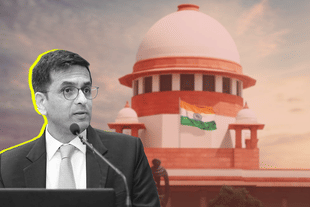News Brief
'You're Saying Re-Interpreting Special Marriage Act Will Have Three Problems', CJI Chandrachud On SG's Submissions
Swarajya Staff
Apr 27, 2023, 02:00 PM | Updated 02:20 PM IST
Save & read from anywhere!
Bookmark stories for easy access on any device or the Swarajya app.


Chief Justice of India (CJI) D Y Chandrachud on Thursday (27 April), while hearing the case on legalisation of same-sex marriages, identified three problems with rewriting the Special Marriage Act (SMA) — the legislation through which the court seeks to legalise same-sex marriages.
The CJI said that as per the government, there are three problems with amending the SMA.
First, it will involve substantial rewriting of the legislation.
Second, it may also include ignoring some provisions which have been introduced as a matter of public policy — such as additional grounds for women in divorce cases.
Third, it would involve reinterpretation of the personal laws because there are segments of the SMA which specifically contain a reference to personal laws.
Solicitor General (SG) Tushar Mehta raised the issue that the SMA, which provides alimony to be paid by the husband to the wife, applies only to heterosexuals.
The petitioners, however, sought for both the “parties” in a homosexual marriage to have the right to identify as the “man” and “wife” in a divorce.
SG Mehta thus pointed out that this might lead to the husband in heterosexual marriages claiming alimony from the wife. The SMA therefore cannot be reinterpreted without harming the interests of heterosexual couples.
SG Mehta further raised the issue of who will be recognised as a “woman” for identifying domicile, issuance of passports, and identifying widow, widower, husband, wife, 'father', 'mother', etc. under the Indian Succession Act.
Mehta also referred to the Domestic Violence Act which identifies the aggrieved person as “a woman who is, or has been, in a domestic relationship with the respondent…” He further cited the Dowry Prohibition Act which mentions the terms “bride” and “bridegroom”.
He also cited the Indian Penal Code which under Section 10, defines “Man” as all male human beings and “Woman” as all female human beings. He further pointed out the definition of rape as per Indian laws under which only a man can be guilty.
Reinterpretation of personal laws
SG Mehta also submitted that the rewriting of the SMA to legalise same-sex marriages would also involve a reinterpretation of personal laws. He raised the issue of the impact on laws of succession if the laws are amended to recognise children of homosexual couples.
“See the definition of full blood and half-blood. We can never reconcile this provision. It says that one man has given birth to a child with a biological woman. Marriage between lesbians – that can’t be read because it wouldn’t be full blood,” Mehta said.
He further pointed out Section 19 of the SMA which says that persons belonging to Hindu, Buddhist, Sikh, and Jain will have to renounce their religion and will not be part of the Hindu family. But the Muslim, Parsi, and Christian personal laws continue to apply to couples married under SMA.
The CJI seemed to agree with Mehta’s argument that personal laws too would have to be reinterpreted with the SMA.





